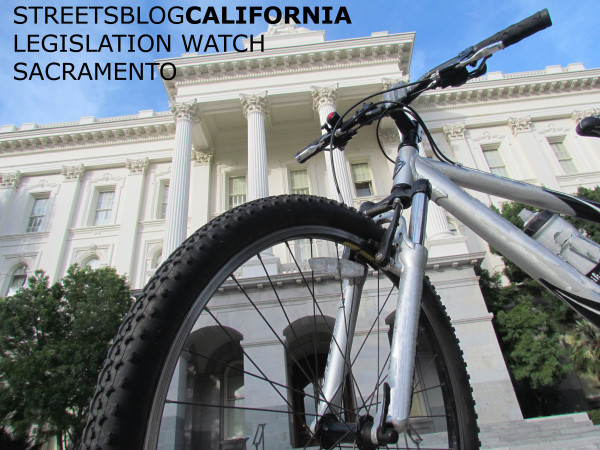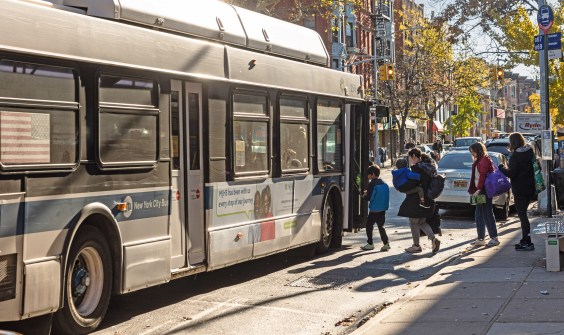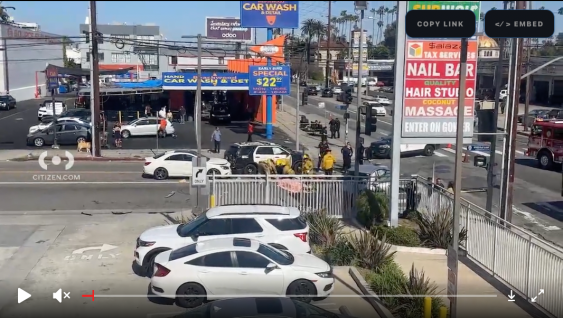The legislature came back from its summer break on Monday, and has only a month to resolve some big goals before the session ends on September 11. Over 600 bills are pending in both the Senate and the Assembly, plus there are behind-the-scenes negotiations on leftover budget issues and two concurrent special sessions aimed at forging agreements on priorities and funding for transportation and health care.
Ongoing budget negotiations include making decisions about allocating the forty percent of cap-and-trade funds that were not assigned to specific programs in last year's budget process. That forty percent is estimated this year at over $1 billion [PDF], and by law it must be spent on reducing greenhouse gas emissions. At the same time, some of the pending bills are wrangling for new ways of cutting up the existing cap-and-trade allocations.
There is also a struggle between those who want to fix the long-term decline in revenue from the gas tax by raising it against those who oppose any new taxes on principle. This is playing out as a face-off between Democrats and Republicans. While Democrats control both houses of the legislature, at least a few Republican votes would be needed to get the necessary two-thirds majority for any increase in taxes.
In other words, there's a lot going on, and how it all works out in the end is anyone's guess at this point.
The Senate Transportation and Infrastructure (Special Session) Committee met this week under chair Senator Jim Beall (D-Campbell) and got a few things done. However, the equivalent Assembly committee has not yet met to hear legislation.
So far most of the conversation on transportation has focused on finding funds to fix potholes and congestion. Active transportation has barely been mentioned, and while transit has gotten some attention, no "alternative" mode has been seriously presented as a solution to transportation funding or infrastructure problems.
In other words, the prevailing attitude so far mostly sounds like the same thing we've heard for years: that we need to fix roads for cars, and that transit “will do nothing for us.” That last is a direct quote from Senator Andy Vidak (R-Hanford) about high speed rail, who also insists that highways 99 and I-5 “desperately need to be widened.” Like so many others, he doesn't seem to understand that all the people in buses and trains are staying out of his car's way and not causing wear and tear on those roads he wants fixed.
Here's a quick recap of some of the bills in play this week:
Raise Taxes and Fees:
SBX1-1, from Senator Beall, would raise the gas and diesel fuel taxes, increase vehicle registration fees and add a $100 fee for zero-emission vehicles plus a “road access charge” of $35 to every vehicle. It would also require Caltrans to increase its efficiency by thirty percent. Naturally a lot of supporters and opposers weighed in on this bill, with Senator Beall urging his colleagues to “work together in a bipartisan way to clean up this mess. We each have to give a little, and think about the future of the state.” He also admitted that this bill only takes “baby steps” towards funding the $100-plus billion backlog of deferred maintenance that's been identified in the state. “It's not the ultimate solution,” he said. “We also need rail and transit.”
The bill passed, with two Republicans (Senators Anthony Cannella, R-Ceres, and Tom Berryhill, R-Twain Harte) abstaining. Whether that means they are open to further discussions is not clear, but the bill will need at least one Republican vote to pass on the Senate floor. Beall's previous attempt at a similar bill, SB16, got stuck on the Senate floor.
End High-Speed Rail: SBX1-3 from Vidak would have eliminated future bonds sold to fund the high speed rail program and used any outstanding money for repair and new construction on highways and local roads. Vidak, as noted above, made it clear that in his eyes widening highways is the solution to California's transportation problems. Senator Connie Leyva (D-Chino) wasn't having it, though. “We cannot continue to add lanes to highways,” she said “We must invest in transit. We have to move forward” to meet the state's climate change goals. The bill was defeated, despite the claim from Senator Patricia Bates (R-Laguna Niguel) that “if it were put to a vote today, we know that two-thirds of voters would vote against high speed rail.”
Decrease Caltrans Payroll: SBX1-9 from Senator John Moorlach (R-Costa Mesa) would have required Caltrans to contract out a growing percentage of its architectural and engineering services to cut down its internal payroll, eventually reaching a 50-50 split between Caltrans employees and consultants. An LAO report had recommended this as a way to save money, but testimony from the Society of Professional Engineers pointed out that it is actually much cheaper to keep those positions in-house than to pay consultants. The bill was defeated.
Two Bills on Governance:
SBX-12 from Senator Sharon Runner (R-Antelope Valley) would remove the California Transportation Commission, which makes transportation funding allocations, from oversight of the California State Transportation Agency, and give it power to program projects not recommended by Caltrans.
SBX1-13 from Senator Vidak would create the Office of Transportation Inspector General, an independent office to ensure all state agencies spend transportation funds efficiently and effectively. It would create a six-year term for a governor-appointed bureaucrat. Beall was interested in the idea, pointing out that other Inspector Generals have resulted in savings and efficiencies.
Both bills passed the committee, although Senator Bob Wieckowski (D-Fremont) wondered aloud whether Governor Brown would sign the second one, since in the past he vetoed a similar one.
Restrictions on Transportation Funding: The committee also considered a constitutional amendment, SCAX1-1, proposed by Senator Bob Huff (R-San Dimas), that would restrict money collected from motor vehicle taxes to be used only for streets and highways. This would prohibit the state from balancing the budget by borrowing funds from transportation, as it has in the past. But it could also impose restrictions on using those funds for transit or to mitigate the costs imposed by cars—like reducing greenhouse gas emissions.
The committee was interested in this amendment, with Beall saying that he would like to see any transportation funding created out of the special session to be constitutionally protected, but Senator Robert Hertzberg (D-Van Nuys) warned about possible unintended consequences from restrictions. The committee ultimately declined to vote on the amendment for now. It would require a two-thirds vote to pass.
Email tips, alerts, press releases, ideas, etc. to melanie@streetsblog.org.
For social media coverage focused on statewide issues, follow Melanie @currymel or Streetsblog California @streetsblogcal on Twitter, or like our Facebook page here.





